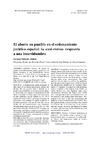Identificador persistente para citar o vincular este elemento:
https://accedacris.ulpgc.es/jspui/handle/10553/56016
| Title: | El aborto no punible en el ordenamiento jurídico español: la -casi eterna- respuesta a una incertidumbre | Authors: | Salinero Alonso, Carmen | UNESCO Clasification: | 560505 Derecho penal | Keywords: | Aborto consentido Menores de 16 y 17 años Derechos sexuales y reproductivos de la mujer Constitucionalidad Interrupción voluntaria del embarazo, et al |
Issue Date: | 2018 | Journal: | Revista electrónica de ciencia penal y criminología | Abstract: | La regulación del aborto en España ha sido objeto de un cambio radical en las últimas tres décadas. De una punición total y absoluta se ha pasado en la actualidad a un sistema mixto de plazos e indicaciones que ampara la despenalización del aborto consentido. El trabajo repasa esta evolución y el salto cualitativo que ha supuesto la LO 2/2010 respecto de la LO 9/1985, que acogió el sistema de indicaciones. Sin embargo, la vigente regulación se encuentra pendiente –van más de ocho años- de un recurso de inconstitucionalidad cuya resolución necesariamente tendrá que partir de la STC 53/1985, que declaró adecuado al texto de 1978 el sistema de indicaciones, pero que, en ningún caso, podrá obviar el desarrollo y progresión de los derechos sexuales y reproductivos de la mujer, internacional y constitucionalmente reconocidos. Legislation of abortion in Spain has changed dramatically in the last three decades. It has passed from an absolute criminalization to a current mixed system of free abortion during the first fourteen weeks followed for the possibility of legal abortion under some circumstances. This work analyzes this evolution, as well as the qualitative leap brought by the Organic Law 2/2010 on Sexual and Reproductive Health and the Voluntary Interruption of Pregnancy, in comparison with the former system contained in the Organic Law 9/1985, in which abortion was only legalized under some circumstances. However, the Organic Law 2/2010 was challenged before the Constitutional Court, and the decision is still pending (after eight years). This judgment will have to take into consideration the Judgment of the Constitutional Court 53/1985. This Ruling declared this system according to the Spanish Constitution. But at the same time, it will have to take into account the sexual and reproductive rights of women, that have been both constitutionally and internationally recognised. |
URI: | https://accedacris.ulpgc.es/handle/10553/56016 | ISSN: | 1695-0194 | Source: | Revista electrónica de ciencia penal y criminología [ISSN 1695-0194], n. 20, p. 31-0 | URL: | http://dialnet.unirioja.es/servlet/articulo?codigo=6745286 |
| Appears in Collections: | Artículos |
Page view(s) 5
656
checked on Jan 15, 2026
Download(s)
284
checked on Jan 15, 2026
Google ScholarTM
Check
Share
Export metadata
Items in accedaCRIS are protected by copyright, with all rights reserved, unless otherwise indicated.
